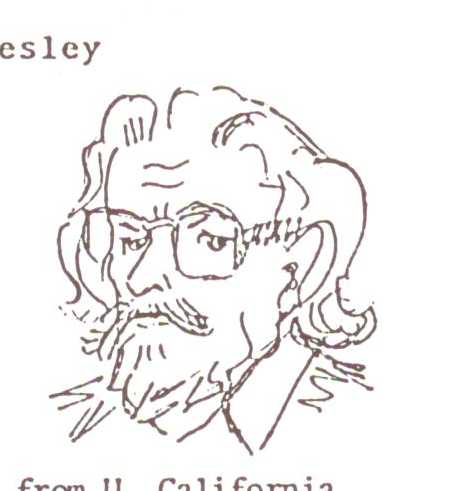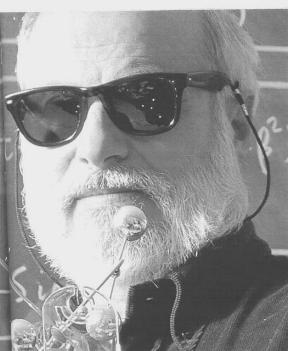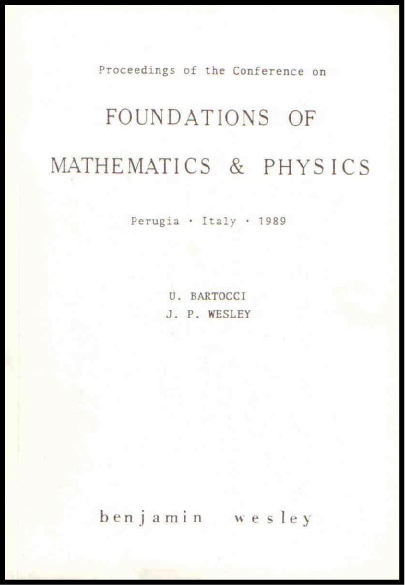-
 Physicist(Quantum Theory, Electrodynamics, Toroidal Ring)\"James Paul Wesley was born in 1921 in St. Louis. He obtained his BA from the U. of Minnesota in 1943 and his MA and PhD from U. California Los Angeles in 1951. He is the father of eight children. In addition to being an established theoretical and mathematical physicist, he is an internationally recognized artist for his oils. His experience includes a postdoctorate at Scripps Inst. Oceanography, a professorship at the U. Idaho, a research position with Newmont Exploration Ltd., a Fellowship at the Ctr. Adv. Study in Behavioral Sciences, research positions at Denver Research Inst., Melpar, and Roland F. Beers. Like many physicists with a conscience, Wesley\'s agitation for peace without nuclear war resulted in the loss of employment and other harrassment. He was a professor at the U. Missouri, Rolla for 10 years. A sabbatical year was spent with I. Prigogine in Brussels In addition to a US patent, Wesley has over 90 publications to his credit and is the author of\" eight books. - From Causal Quantum Theory (1983).
Physicist(Quantum Theory, Electrodynamics, Toroidal Ring)\"James Paul Wesley was born in 1921 in St. Louis. He obtained his BA from the U. of Minnesota in 1943 and his MA and PhD from U. California Los Angeles in 1951. He is the father of eight children. In addition to being an established theoretical and mathematical physicist, he is an internationally recognized artist for his oils. His experience includes a postdoctorate at Scripps Inst. Oceanography, a professorship at the U. Idaho, a research position with Newmont Exploration Ltd., a Fellowship at the Ctr. Adv. Study in Behavioral Sciences, research positions at Denver Research Inst., Melpar, and Roland F. Beers. Like many physicists with a conscience, Wesley\'s agitation for peace without nuclear war resulted in the loss of employment and other harrassment. He was a professor at the U. Missouri, Rolla for 10 years. A sabbatical year was spent with I. Prigogine in Brussels In addition to a US patent, Wesley has over 90 publications to his credit and is the author of\" eight books. - From Causal Quantum Theory (1983).Residing in Germany during his retirement years, Paul Wesley\'s pioneering work in dissident physics in the 1980s and 1990s anticipated much of what has and what is certain yet to transpire in the 21st century. Along with ground-breaking colleagues like Stefan Marinov, Franco Selleri, and Umberto Bartocci, Wesley organized and motivated the early dissident community in Europe, editting several conference proceedings in addition to writing seven self-published books of his own. In 1991, he coauthored with David L. Bergman the paper that first proposed a toroidal ring model for the electron. With a publication total in excess of 100, Wesley was mentioned several years in Who\'s Who in the World and in Who\'s Who in Physics.
Paul Wesley married Gabriele Wesley-Modest in Berlin, and lived with her and three children Carl-Eric, Julia, and Benjamin in Berlin, Lenzkirch, and Blumberg.
Career Highlights:
- 1961-1962: Fellowship, The Center for Advanced Studies in the Behavioral Sciences, Stanford, California
Concurrent Special Fellowship: National Institutes of Health - 1962-1963: Denver Research Institute effort on writing the book ecophysics ?the application of physics to ecology?
6 months working with Melpar, Inc., Falls Church, Virginia - 1963-1974: University of Missouri-Rolla, Professor. The university provided a research grant for the summer 1967.
- 1965-1966: NASA provided a year\'s grant to estimate the likelihood of life existing in the solar system.
- 1971: Sabbatical with I. Prigogine at the University Libre de Bruxelles, Brussels, Belgium
- 1974-2007: Living and doing research in Germany
- 1961-1962: Fellowship, The Center for Advanced Studies in the Behavioral Sciences, Stanford, California
-
 Math Historian(Special Relativity, History of Science)
Math Historian(Special Relativity, History of Science)Umberto Bartocci was born in Rome, in 1944. In 1967 he graduated in Pure Mathematics with Prof. Beniamino Segre, and then he became his Assistant. After two years of specialization in Cambridge (UK), in 1976 he was appointed Full Professor of Geometry at the University of Perugia. Since then, in Perugia he taught many mathematical courses, mostly concerning Algebra and Geometry, and since 1980 even History of Mathematics.
He slowly realized that there was a strong ideological connection between Darwinism, the formalistic foundation of Mathematics which lead to a Mathematics without Intuition, and the "irrationalistic" development of 20th Century Physics, which started with Relativity and arrived to the widespread interpretation of Quantum Mechanics. The empirical success of Physics reinforced which in his opinion was a bad Philosophy of Mathematics, and he understood that any critical approach to the foundations of his own discipline was impossible, unless it did involve foundations of Physics too.
Thus he started studying the logical and empirical foundations of Relativity, in a long intellectual travel which led to the organization of international meetings, publishing papers, and more recently even the edition of the journal Episteme. Rather deluded for the negligible results attained in front of a great effort, he did retire from teaching and research in 2006.
Most relevant activity:
- 1989, Perugia, Meeting: THE FOUNDATIONS OF MATHEMATICS AND PHYSICS IN 20TH CENTURY: THE REJECTION OF INTUITION
- Umberto Bartocci and James Paul Wesley, Editors, Proceedings of the Conference on Foundations of Mathematics & Physics, Benjamin Wesley Publ., Blumberg, Germany, 1990.
- "Symmetries and Asymmetries in Classical and Relativistic Electrodynamics" (with Marco Mamone Capria), Foundations of Physics, 21, 7, 1991.
- "Some Remarks On Classical Electromagnetism and the Principle of Relativity" (with Marco Mamone Capria), American Journal of Physics, 59, 11, 1991.
- 1991, Ischia, Meeting: WHAT PHYSICS FOR NEXT MILLENNIUM?
- Quale fisica per il 2000? Prospettive di rinnovamento, problemi aperti, verit? ?eretiche?, Convegno Internazionale, Ischia, 1991, Atti a cura di Giuseppe Arcidiacono, Umberto Bartocci, Marco Mamone Capria, Ed. Andromeda, Bologna, 1992.
- America: una rotta templare - Un?ipotesi sul ruolo delle societ? segrete nelle origini della scienza moderna, dalla scoperta dell?America alla Rivoluzione copernicana, Ed. Della Lisca, Milano, 1995.
- 1996, Perugia, Meeting: DESCARTES AND THE SCIENCE.
- "About the violations of the action-reaction principle in Maxwell-Lorentz electrodynamics, and the possibility of "perpetual motion" machines", Physics as a Science, Colonia 1997, Proceedings, Hadronic Press, 1998.
- Une utopie scientifique ? la d?couverte d?un Nouveau Monde, Politica Hermetica, L?Age d?Homme, Paris, N. 12, 1998.
- Albert Einstein e Olinto De Pretto: la vera storia della formula pi? famosa del mondo, Ed. Andromeda, Bologna, 1999.
- La scomparsa di Ettore Majorana: un affare di stato?, Ed. Andromeda, Bologna, 1999.
- Most common misunderstandings about Special Relativity, Proceedings of "Galileo Back in Italy II", Bologna, Ed, Andromeda, 2000. http://www.cartesio-episteme.net/ERRORSVF.htm
- A strictly special-relativistic discussion of Ehrenfest paradox and Sagnac experiment suggests another possible experimental falsification of Special Relativity, 2000. http://www.dipmat.unipg.it/~bartocci/EHRphes.html
- "Looking for a Possible Breakdown of Local Lorentz Invariance for Electromagnetic Phenomena: Theory and First Experimental Results" (with Fabio Cardone and Roberto Mignani), Foundations of Physics Letters, Vol. 14, N. 1, 2001.
- "A Simple ?Classical? Interpretation of Fizeau?s Experiment" (with Giuseppe Antoni), Apeiron, Vol. 8, N. 3, July 2001.
- "Looking for Special Relativity?s Possible Experimental Falsifications", Episteme, N. 6, Part II, Dec. 2002. http://itis.volta.alessandria.it/episteme/ep6/ep6-II.htm
- "I paradossi di Zenone sul movimento e il dualismo spazio-tempo, con un?appendice sulle definizioni matematiche di discreto e continuo", Episteme, N. 8, Sett. 2004. http://www.cartesio-episteme.net/ep8/ep8-zeno.htm.
Proceedings of the Conference on Foundations in Mathematics and Physics
Authors


